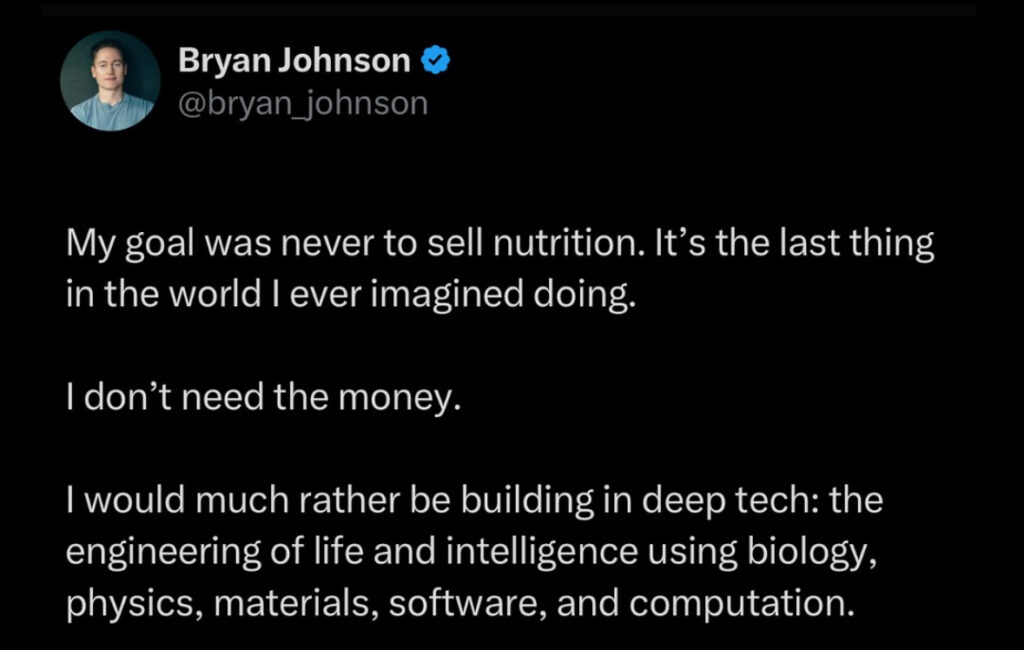Team Labubu? Or Team Longevity? – How Turbo-Trends Even Make Lifespan Short-Term
Team Labubu? Or Team Longevity? – How Turbo-Trends Even Make Longevity Short-Term
In a turbo-trend society, where viral sensations whip us through life like a whirlwind, even the noblest goal—longevity—becomes a short-term illusion. As I was hunting Labubu dolls with my daughter last Saturday—these cute monster figures that have become a global collecting frenzy in 2025 and sell out in seconds—I had to reflect once again on our optimization society, which I described in my book “The Infected Thinking” in 2020. And just a few Saturdays ago, I sat with Bryan Johnson in Stockholm in the evening and talked exactly about that topic: Optimization through longevity hacks for a life up to 120 and his “Don’t Die” initiative. Yet paradoxically, this hype machinery turns the long-term into something fleeting: We buy quick fixes, share viral moments, and ignore the real consequences. Is that the price for our endless rush?
Labubu embodies pure short-termism: These “ugly-cute” vinyl and plush figures from blind boxes, inspired by a children’s book series, have led in 2025 to long lines in front of Pop-Mart stores and exploding prices—a trend reminiscent of Beanie Babies or Cabbage Patch Kids. Celebrities hype them, fans tattoo designs (that fade quickly), and social media explodes with posts like “I am the owner of the one and only black diamond labubu.” It’s the epitome of instant gratification: Buy, share, forget. In a turbo-society, Labubu drags us into the moment, without a glance toward tomorrow.
Now to longevity, the seemingly long-term counterpart: In 2025, this trend dominates the wellness industry with functional nutrition, AI-driven apps, biohacking, and personalized hacks for healthy aging. Billion-dollar markets are emerging, from GLP-1 medications to regenerative treatments to longevity technologies like predictive healthcare. It sounds like foresight: We invest in a longer life, combating aging at the cellular level. Yet the turbo-trend society twists it—longevity becomes short-term consumption: Quick supplements for immediate results, viral challenges on TikTok, gadgets that are out next year. Instead of sustainable lifestyles, we chase hypes like “circadian rhythm hacks” or “functional fragrance,” which force us into constant optimization without real depth. Even Bryan Johnson, for some the biohacker icon, and his “Don’t Die” initiative end up in the vortex; this week he posted on X that he never wanted to sell pills and “I don’t need the money”—a perfect example of how good intentions flow into short-term market trends. A turnaround or a revelation? At least his approach to understanding life and consciousness aligns with my vision and sounds more profound.

The connection between Labubu and longevity? Both are victims and drivers of the turbo- and optimization society: Labubu is the overt short-term hype, longevity disguises itself as long-term but becomes another viral rush. Algorithms push both—posts about Labubu memes or longevity tips—and monetize our attention.
It’s no longer about whether something is real, because the real has been replaced. As Jean Baudrillard describes, we live in a world where signs, images, and data streams no longer refer to reality but only to each other. Experiences have been replaced by their representation: The boundary between what happens and how it appears is barely perceptible; the everyday increasingly takes place in its simulation.
Labubu is not a toy, but a viral code. Longevity not a health concept, but a well-staged promise. Their meaning arises not from what they are, but from how they circulate. Reality is no longer the measure. What counts is effect. Visibility. Repeatability.
In the end, this society drags us through life: From Labubu to longevity, faster and faster, more and more fleeting. The singularity—where AI overtakes us—could be the ultimate twist, but even without it: Will we survive in this shortsightedness?
Is it time to wake up? Should we, instead of hoarding dolls or swallowing pills, seek real long-term thinking—beyond the hype? Because in the world of signs, even eternity loses its claim to permanence—it appears only as a fleeting gesture in the stream of the ever-same.
